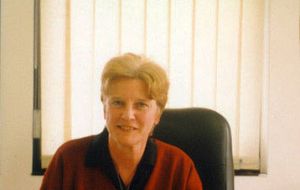MercoPress. South Atlantic News Agency
Falklands oil basin open to all companies including from Argentina
 Phyll Rendell told BNAmericas that any oil production round the Falklands is still at least ten years away.
Phyll Rendell told BNAmericas that any oil production round the Falklands is still at least ten years away. The Falkland Islands would welcome more interaction with Argentine oil and gas companies as the search for what could be large offshore oil and gas reserves heats up, Falkland Islands director of minerals and agriculture Phyl Rendell told BNamericas.
After the UK regained control of the Islands in the 1982 Falklands conflict, Argentina imposed strict travel and flight restrictions to the archipelago and still claims sovereignty. Weekly flights from southern Chile provide the only air link to South America.
As Argentina ramps up its offshore exploration in nearby waters, the Argentine press has speculated that the government could be prohibiting firms with operations in Argentina from conducting similar work in the Falkland Islands.
“I'm not aware of that, and companies haven't told me about that. But if that is the case, that is unhelpful,” Rendell said. “Most of the companies we've got working here don't work in Argentina, so probably that issue hasn't arisen yet.”
Argentine firms, meanwhile, would be welcome in the search for offshore oil and gas. “We welcome the activity. It's very good if they get on and drill,” Rendell said, referring to offshore exploration being conducted in Argentine waters.
Argentine companies have respected offshore waters claimed by the Falkland Islands, although Argentina does not publicly acknowledge the area, both Rendell and firms operating in the area confirmed.
The Falkland Islands government would even welcome Argentine oil major YPF as a non-majority partner, Rendell added. “We would have no problem at all with YPF being a non-majority partner,” she said, noting that YPF had submitted an offer before with BG.
While continued flight restrictions from Argentina hinder the development of local industries, the oil and gas sector is prepared and could circumvent travel restrictions because of the funds involved.
“We'd like to have more communications with South America, and they're preventing that. That inevitably will complicate things when it comes to oil and gas exploration,” Rendell said. “Their political stance and restrictions on our movements are harmful to our economic development. And we are striving to develop our economy with that threat over us.
”The funding is so great, though, that they can fly in from wherever. The oil industry is a bit bigger. They will be able to override those problems,“ she continued.
If oil and gas were to be found, oil firms would most likely use floating production, storage and offloading vessels. ”It's what they do off Brazil. It would be quite feasible to process the oil offshore and then ship to whichever refinery the companies send it to,“ Rendell said. ”It doesn't have to go to Argentina at all. You can completely bypass Argentina.”
Any hydrocarbons production, which Rendell said is at least 10 years off, would be subject to a nine percent royalty and a corporate tax of about 21 percent.
London-listed Rockhopper Exploration (AIM: RKH) reported the first ever discovery offshore the Falkland Islands earlier this month at its 14/5-1A well. The discovery was named the Johnson structure and could hold from 1.6 to 7.9 Tcf of natural gas.
Rockhopper has a 100 percent interest in the PL023, PL024, PL032 and PL033 licenses in the North Falkland Basin that cover 3,800 square kilometres (1,467 sq miles). The company last year said the licenses could hold over 3.5 billion barrels of recoverable oil.
London-listed Falkland Oil & Gas (AIM: FOGL), meanwhile, said in March that it would be ready to begin drilling in the third quarter of the year.
FOGL farmed out a 51 percent stake in its Falkland Island blocks to BHP Billiton (NYSE: BHP) last year for US$12.8 million. BHP Billiton is funding more than two-thirds of the committed two-well program.
FOGL has said its blocks in the area could hold a prospect inventory in excess of 10 billion BOE.
In nearby Argentine waters, a new consortium led by YPF will invest US$100 million to conduct exploration and production work 289 kilometres (179.5 miles) off the coast of the country's Tierra del Fuego province in the Falkland Islands Basin.
YPF will hold 33.5% of the consortium, as will Argentine oil firm Pan American Energy. Brazil's Petrobras (NYSE: PBR) will hold 33%.
Argentine state firm Enarsa also said last year that it would tender offshore blocks in the area. With the southern hemisphere winter in full swing, E&P is now winding down off the Falkland Islands coast.
“It was quite a busy summer season, with a lot of data acquisition going on,” Rendell said, adding that exploration had now stopped for the winter.
“The next step is to contract a rig to come and drill exploration wells, and rigs are difficult to contract at the moment. It's a combination of high demand and then finding the right sort of rig to work in a remote part of the world. The conditions are quite rough,” she continued.
Companies have, however, seen the market begin to ease and expect things to improve next year.
“We're not going to count on any discovery until one is made,” Rendell said when asked on the reports of large oil and gas reserves made by some companies currently conducting exploration.
“They are technically realistic, but we wouldn't want to count on that until we have wells drilled and a discovery is made,” she said.


Top Comments
Disclaimer & comment rulesCommenting for this story is now closed.
If you have a Facebook account, become a fan and comment on our Facebook Page!